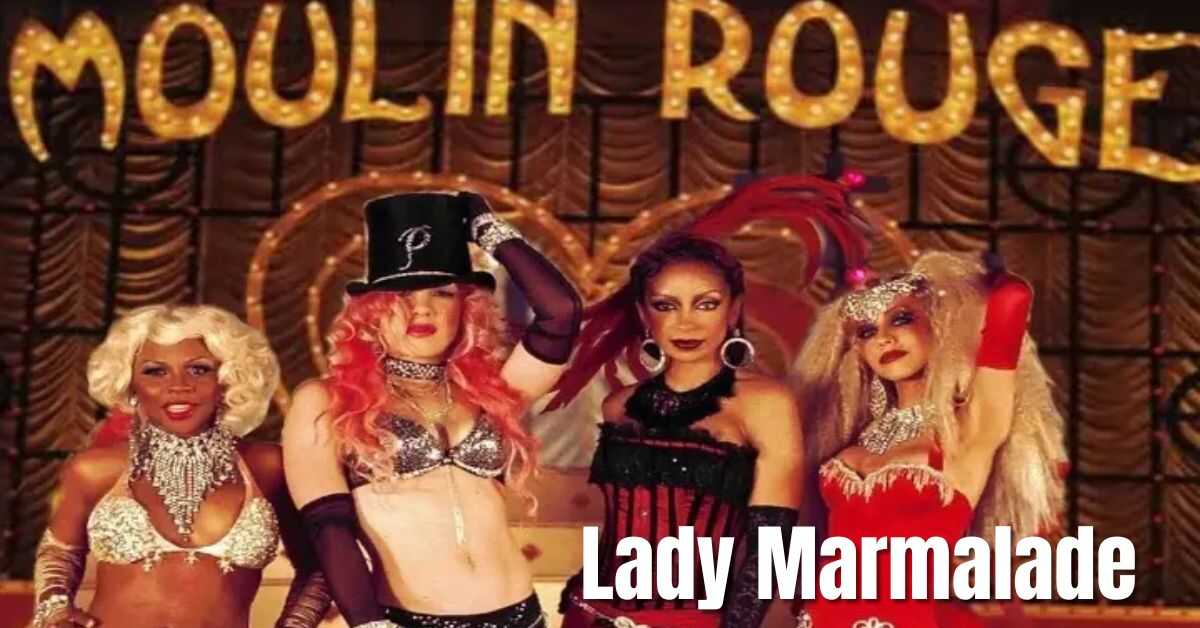The song Lady Marmalade is one of the most iconic tracks in music history. Its bold lyrics, infectious rhythm, and rich cultural references have captivated audiences for decades. But what makes the song truly unforgettable is its deep connection to the sexual liberation in music, its empowering themes, and its timeless ability to challenge societal norms. This article dives into the Lady Marmalade lyrics meaning, the history behind its creation, and its impact on pop culture.
“Lady Marmalade” Historical Context
Lady Marmalade was released in 1974 by the girl group Labelle. The song was written by Bob Crewe and Kenny Nolan, inspired by the vibrant and diverse energy of the 1970s French Quarter culture in New Orleans. The city, known for its rich Creole influences in music, jazz, and colorful nightlife, provided the perfect backdrop for a song that dared to push boundaries.
During this time, the sexual revolution and music were reshaping cultural norms. The 1970s saw a growing movement that questioned gender roles and challenged gender norms in the 1970s. Lady Marmalade reflected this shift with its daring lyrics and sultry melody. Its use of French phrases, like the famous “Voulez-vous coucher avec moi,” added a sense of mystery and a nod to the cultural legacy of French phrases in songs. This international flair helped the song resonate across cultures.
The Sexual Revolution Reflected in the Lyrics
The lyrics of Lady Marmalade were bold and unapologetic. The line “Voulez-vous coucher avec moi” translates to “Do you want to sleep with me?” It was a daring statement at a time when discussing sexuality openly was rare. This phrase became a symbol of “Voulez-vous coucher avec moi” cultural significance, representing the confidence of women who were unafraid to express desire.
The song aligned with the feminist movement of the 1970s, making it a feminist anthem in music. It celebrated women taking charge of their sexuality, turning traditional gender roles on their head. The narrative of a powerful, self-assured woman in the song reflected the intersection of music and the sexual revolution. This theme of empowerment through bold lyrics resonated with audiences and added depth to its catchy tune.
Read More About: Daylight David Kushner Meaning – Insights and Interpretation
The Song’s Reception and Impact On Society
When Labelle released Lady Marmalade, it became an instant hit. The song not only topped the charts but also sparked conversations about societal taboos. Its success marked a pivotal moment in feminism in the music industry, as it gave women a voice in pop culture to express themselves without fear of judgment.
In 2001, the song was reimagined by Christina Aguilera, Lil’ Kim, Mýa, and Pink for the movie Moulin Rouge. This version, with its glamorous music video, brought the song to a new generation. It showcased Christina Aguilera and modern reinterpretation while keeping the essence of Labelle’s impact on feminist music alive. The collaboration highlighted female-driven collaborations in music, making it a celebration of artistry and unity among women. The song won a Grammy, cementing its legacy as a timeless classic.
| Year | Version | Artists | Impact |
| 1974 | Original | Labelle | Celebrated women’s empowerment |
| 2001 | Moulin Rouge Version | Christina Aguilera, Lil’ Kim, Mýa, and Pink | Won Grammy, revived feminist themes |
FAQs
Who originally sang Lady Marmalade?
The original Lady Marmalade was sung by Labelle in 1974. It became a groundbreaking hit that celebrated empowerment through music.
Who won a Grammy for Lady Marmalade?
The 2001 rendition by Christina Aguilera, Lil’ Kim, Mýa, and Pink won a Grammy for Best Pop Collaboration. It was praised for its blend of cross-cultural elements in pop hits.
Is the song Lady Marmalade in burlesque?
While not part of the movie Burlesque, the song’s style aligns with burlesque themes. Its connection to Moulin Rouge made it synonymous with theatrical glamour.
How do you pronounce Lady Marmalade?
It’s pronounced as “Lay-dee Mar-mah-lahd.” The pronunciation reflects the French influences in its title.
Conclusion
Lady Marmalade is more than just a song. It is a cultural phenomenon that broke barriers and redefined the role of women in music. From its bold expressions of desire in pop lyrics to its reflection of social change reflected in music, the track remains a powerful reminder of the past and a beacon of empowerment for the future. Its evolution, from Labelle to Moulin Rouge, shows how timeless its themes are. What’s your favorite version of Lady Marmalade? Share your thoughts below.







